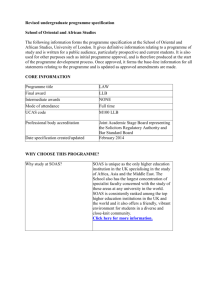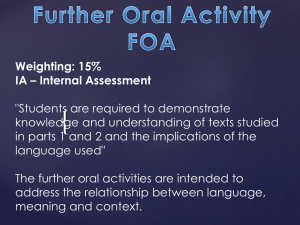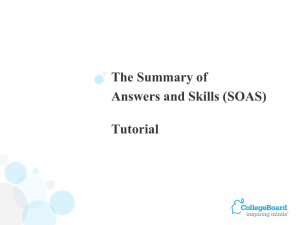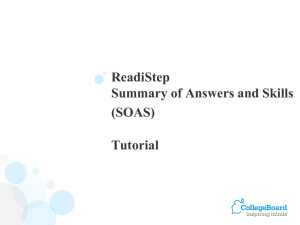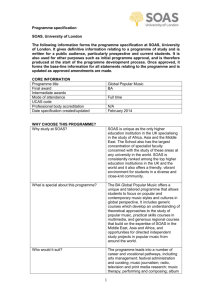Draft revised undergraduate/postgraduate programme specification
advertisement
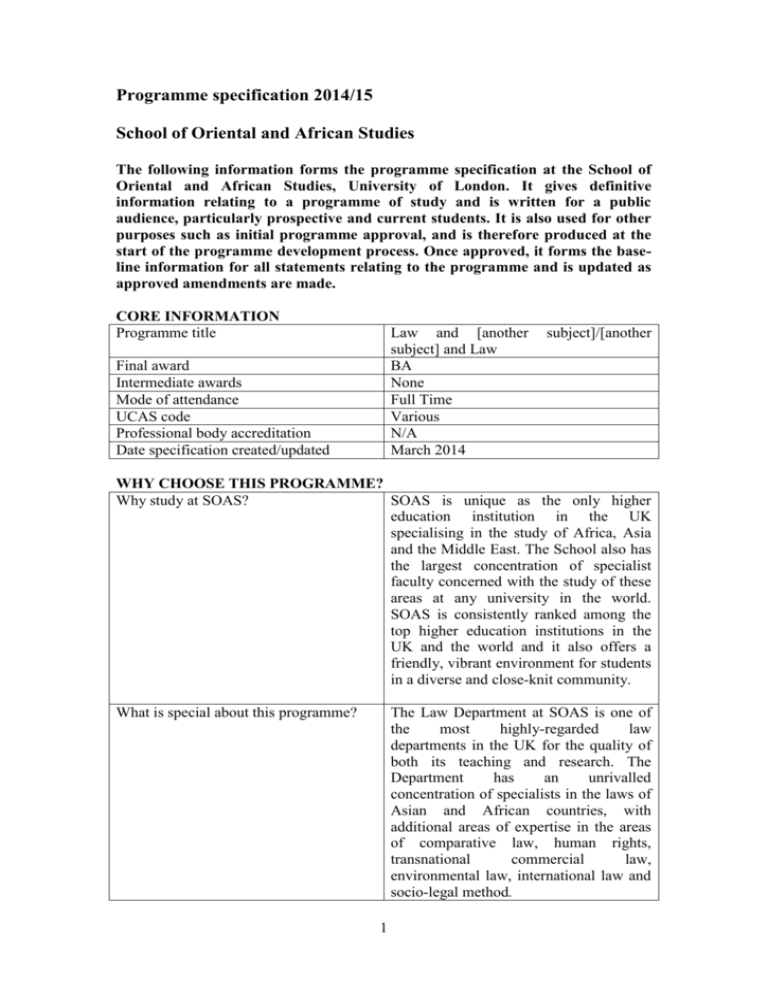
Programme specification 2014/15 School of Oriental and African Studies The following information forms the programme specification at the School of Oriental and African Studies, University of London. It gives definitive information relating to a programme of study and is written for a public audience, particularly prospective and current students. It is also used for other purposes such as initial programme approval, and is therefore produced at the start of the programme development process. Once approved, it forms the baseline information for all statements relating to the programme and is updated as approved amendments are made. CORE INFORMATION Programme title Law and [another subject] and Law BA None Full Time Various N/A March 2014 Final award Intermediate awards Mode of attendance UCAS code Professional body accreditation Date specification created/updated subject]/[another WHY CHOOSE THIS PROGRAMME? Why study at SOAS? SOAS is unique as the only higher education institution in the UK specialising in the study of Africa, Asia and the Middle East. The School also has the largest concentration of specialist faculty concerned with the study of these areas at any university in the world. SOAS is consistently ranked among the top higher education institutions in the UK and the world and it also offers a friendly, vibrant environment for students in a diverse and close-knit community. What is special about this programme? The Law Department at SOAS is one of the most highly-regarded law departments in the UK for the quality of both its teaching and research. The Department has an unrivalled concentration of specialists in the laws of Asian and African countries, with additional areas of expertise in the areas of comparative law, human rights, transnational commercial law, environmental law, international law and socio-legal method. 1 Who would it suit? The degree provides students with a wide range of analytical and transferable skills and is suitable for any profession in which a non-specialised degree is required. Although the BA is NOT a qualifying law degree for the purposes of both the Law Society and Bar Council it does provide partial exemption (depending upon the options chosen) for any intending solicitor or barrister from some courses on the Postgraduate Diploma in Law, which is the first stage of professional training that must be undertaken by any non-law graduate intending to qualify as a solicitor or barrister. Programme structure (First year: Legal Systems of Asia and Africa is compulsory for all students in the 1st year. Introduction to Law and Legal Processes (ILLP) is also compulsory. Those students who can do so take ILLP in their first year. Students on most language courses, however, are obliged to take three language units. Nearly all such students, therefore, take ILLP in their second year (given the range of languages available, it may not be possible for a student to take ILLP in the second year: in such a case, a dispensation is granted by the School of Law and the student is allowed to take another law subject, usually Obligations I (Contract)). Second year: no compulsory courses. Third year: no compulsory courses. For the word ‘Law’ to be mentioned in the title of the degree, a student registered for a 3 year degree must pass at least 4 law course units; if the word ‘Law’ is to come first, the student must pass at least 5; in the case of a 4 year degree the equivalent numbers of course units are 7 and 5. Further details are set out in the Undergraduate Regulations. 2 It will be clear from this structure that the student has a great deal of freedom to construct his or her course. Advice is regularly provided, mainly through the Undergraduate Tutor, on the range of possibilities, and in particular the relationship of the programme as taken by the individual student with the requirements for exemption from the academic stage of legal education. Through unseen examinations and assessed coursework, usually in the proportion of 80% examination and 20% coursework, although this is under review. Final year students may, with permission, undertake an Independent Study Project, resulting in a 10,000 word essay. Assessment summary ENTRY REQUIREMENTS SOAS has general minimum entrance requirements for registration for an undergraduate degree and these can be viewed at (http://www.soas.ac.uk/admissions/ug/entryreq/) A Levels: A*AA IB: 38 (7/6/6) BTEC: DDD Scottish Highers: AAAAA Scottish Advanced Highers: AAA Irish LC: 360 points from 5 Higher level subjects at grade C1 or above Advanced Placement: 4 5 5 (Two semesters - UCAS Group A) plus US HSGD with GPA 3.0 Euro Bacc: 85% French Bacc: 15/20 German Abitur: 1.5 Italy DES: 85/100 Austria Mat: 1.5 Polish Mat: 80% PROGRAMME AIMS What will this programme give the student an opportunity to achieve? To introduce students to the skills essential for an understanding and analysis of law in various contexts, in combination with another subject. To encourage the development of specialized knowledge and understanding of particular fields of law, especially where these are related to the student’s other subject of study. To develop skills of analysis and expression, both oral and written. To develop additional skills and knowledge in accordance with the requirements of the legal professional bodies as issued from time to time. 3 PROGRAMME LEARNING OUTCOMES What will the student learn? Knowledge Knowledge and understanding of the main types of legal systems, particularly those relevant to Asia, Africa and the Middle East; A knowledge of the sources of the law of England and Wales, and how it is made and developed; of the institutions within which that law is administered and the personnel who practice law; Students are also expected to acquire specialist knowledge in other course units. This includes, but is not necessarily confined to, knowledge and understanding of the following: a) the theoretical, practical and comparative underpinnings of legal doctrine; b) the context in which legal initiatives take place; c) the role played by law in different social, cultural and economic environments; d) the role and function of legal institutions, including those in selected legal systems in Asia and Africa, and those of the international community; e) the weight and significance of different sources and methodologies; f) knowledge of how to locate relevant materials and assess their relevance and/or importance. Intellectual (thinking) skills Students should become precise and careful in their assessment of legal arguments, and understand the strengths and weaknesses of different approaches to legal issues. Students should be able to engage in theoretical and conceptual debate concerning the role of law and legal institutions. Subject-based practical skills To apply knowledge to complex situations; To recognise potential alternative conclusions for particular situations, and provide supporting reasons for them; To select key relevant issues for research and to formulate them with clarity; To use standard paper and electronic resources to produce up-to-date information; To make a personal and reasoned judgement based on an informed understanding of standard arguments in the area of law in question; To use the English language and legal terminology with care and accuracy; 4 To conduct efficient searches of websites to locate relevant information; to exchange documents by email and manage information exchanges by email; To produce word-processed text and to present it in an appropriate form. Write good essays and dissertations Transferable skills Structure and communicate ideas effectively both orally and in writing; and digest rapidly and effectively substantial amounts of reading. Develop critical awareness of issues in various subject areas. Use a wide range of written and digital materials, in libraries and research institutes, of a kind and range that they will not have used as undergraduates. Present material orally. PROGRAMME STRUCTURE AND REQUIREMENTS FOR GAINING AN AWARD How will the student’s study be structured? How will they achieve an award? Structure, duration and requirements for gaining an award SOAS has standard requirements relating to the structure and duration of undergraduate programmes and for the award and classification of these programmes. Details can be found at http://www.soas.ac.uk/registry/degreeregulations/file60378.pdf Programme structure diagram Below is a structure diagram for this programme. Level Year of Course Course title Credit study code 155200049 Introduction 30 4 1 to Law & Legal Processes 4 1 Various 4 1 Various 4 1 Various A course in 30 the second degree subject A course in 30 the second degree subject A course in 30 the second degree 5 Status Notes Compulsory If the other subject has 3 compulsory units.( Most Languages) subject 4 Or 1 155200029 Legal 30 Systems of Asia and Africa 4 1 155200049 Introduction 30 to Law & legal Processes 4 1 Various 4 1 Various 5 2 155200029 A course in 30 the second degree subject A course in 30 the second degree subject Legal 30 Systems of Africa and Asia 5 2 Various 5 2 Various 5 2 Various A course in 30 the second degree subject or course available in the law department A course in 30 the second degree subject or course available in the law department A course in 30 the second degree subject or course 6 Compulsory If the other subject has 2 compulsory units. Compulsory If the other subject has 2 compulsory units. Compulsory If not taken in Year 1 then you must take in Year 2 (unless student is abroad) 6 3 155200029 6 3 Various 6 3 Various 6 3 Various available in the law department Legal 30 Systems of Asia and Africa Compulsory If not taken in Year 1 nor Year 2 (because student was on year abroad) then must be taken in Year 3 A course in 30 the second degree subject or course available in the law department A course in 30 the second degree subject or course available in the law department A course in 30 the second degree subject or course available in the law department The availability of optional/elective courses may vary in a given academic session due to factors such as staff absence and student numbers. For an up to date list of courses running in a given academic session please refer to the degree structures as listed on the SOAS website for the degree programmes taught by each Department. Level 5 (second year) Law Options 30 credit options: 155200055 Chinese Law 155200034 Criminal Law 155200051 European Human Rights Law/ EU Law 155200059 Intellectual Property Law 155200037 Islamic Law 7 155200033 Law and Society in Africa NOT RUNNING 14/15 155200032 Law and Society in South Asia 155200014 Law of Contracts 155200019 The Law of Tort 155200019 Law of Property 155200005 Public Law Level 6 (third / FINAL year) Law options 30 credit options: 155200061 Advanced Administrative Law 155200055 Chinese Law 155200054 Company Law 155200062 Commercial Law 155200063 Environmental Law 155200017 Equity and Offshore 155200006 Family Law 155200065 Global Commodities Law – NEW COURSE 155200059 Intellectual Property Law 155200037 Islamic Law 155200060 Law of Islamic Finance NOT RUNNING 14/15 155200064 Law, Multiculturalism & Rights - NEW COURSE 155200025 Public International Law 155200030 Law and Development 155200056 Labour Law 155200041 Independent Study Project TEACHING, LEARNING AND ASSESSMENT Knowledge Students are required to attend all classes, study extensively on their own and together with other students, and prepare themselves to participate in an informed way in discussions. Students are also required to undertake assessed coursework and, in the ILLP course, to participate in assessed mooting (oral legal argument). The usual format of classes is 2 hours of lectures per week, plus 1 hour of tutorial per week in professional exemption course units, or 1 hour of tutorial per fortnight in other course units. Some course units, usually for final year students only, consist of a weekly seminar with no separate tutorials. Particular importance is accorded to the needs of first year students. The convenor of the ILLP course has less teaching hours than normal in order to be able to combine his/her convenorship with the pastoral care of the first year students. Assessment: These skills are assessed as part of the normal assessment of coursework and unseen examination. Final year students may, with permission, undertake an Independent Study Project of a 10,000 word essay. Intellectual (thinking) skills Critical thinking is fostered in all course units offered in the Programme, in that all units introduce information and ideas that need to be assessed critically and analysed in context. Students are encouraged not simply to summarise 8 evidence and arguments but also develop their own assessments as to the relative value of different strategies/ arguments/ evidence. Assessment: These skills are assessed as part of the normal assessment of coursework and unseen examination. Final year students may, with permission, undertake an Independent Study Project of a 10,000 word essay. Subject-based practical skills Through tutorials and coursework, particularly in instruction concerning the answering of problem questions and the compulsory mooting component of the Introduction to Law and Legal Processes (ILLP) course unit. The production of word-processed text and its presentation is not taught as such, but coursework is required to be produced in word-processed form; some subject based Practical skills are specifically taught in the ILLP course unit. Assessment: These skills are assessed as part of the normal assessment of coursework and unseen examination. Transferable skills Through preparation for seminars, essays, course work, and examinations. Through individual and /or joint seminar presentations and class participation. Through preparation for seminars, through discussion in seminars, through correction of course work by tutors and through preparation of answers to exam questions. Through the formation of study groups Assessment: These skills are assessed as part of the normal assessment of coursework and unseen examination. REFERENCE POINTS What has been the basis for the design of this programme? The programme was designed to provide undergraduate students with a flexible course in which they can study a non-legal discipline or a language together with the law subjects most relevant to their particular needs. Since its inception, the programme has been monitored and amended in order to ensure that it is up to date and that it deals with issues of contemporary relevance, as well as to ensure that it complies with: 1. the QAA Benchmark Standards for Law Degrees in England, Wales and Northern Ireland; 2. the requirements of the legal professional bodies; 3. SOAS teaching and learning strategy. In particular, note the pastoral care available to first year students, as well as the provision of Human Rights Law in the latter half of the European Law course unit in view of the growing importance of this subject. QUALITY ASSURANCE AND ENHANCEMENT SOAS has internal procedures to assure the quality of provision to be offered to students and to enhance the quality in the light of experience following delivery, taking into account the input of external experts and students. The procedures are set out in the School’s Quality Assurance Handbook and can be viewed at ( http://www.soas.ac.uk/add/qualityassurance/quality-assurance-handbook/). 9 SOAS is also subject to periodic external review from bodies such as the Quality Assurance Agency for Higher Education and relevant professional and statutory regulatory bodies. The procedures described in the Quality Assurance Handbook are in place to provide a high quality student experience for those choosing to study at SOAS, and student input and evaluation of their experiences is greatly valued. Students make an input to the ongoing development of their programmes, and the environment in which they operate, in a number of ways, including: formal student evaluation as part of the annual programme review; student representation on School committees at various levels (through the Students’ Union) where many relevant issues are discussed; FURTHER INFORMATION SOAS Vision and Strategy Statement; Undergraduate Handbook Quality Assurance Handbook; UCAS website; QAA website; 10

